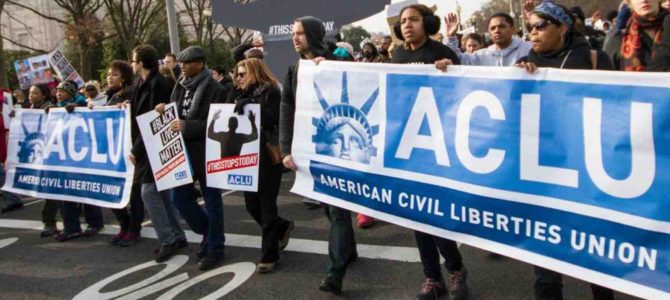
The American Civil Liberties Union, an organization that once so rigidly adhered to the neutral principles in the Constitution that it famously defended the right of a neo-Nazi group to march through the Jewish-laden Chicago suburb of Skokie, has been increasingly rejiggering its positions to correspond with the Left’s hard lurch towards cafeteria constitutionalism.
This week, for example, one of its senior policy analysts came up with an imaginative rationalization for limiting gun rights. “The wide availability of guns and their misuse is leading to restrictions on Americans’ freedom,” the organization tweeted this week, “and that needs to be part of the firearms debate.” The piece the tweet links to makes a, “A Pro-Liberty Case for Gun Restrictions,” which, though it’s become a tediously misused cliché over the years, can only be described as Orwellian.
It’s one thing to offer a “collective rights argument” regarding the Second Amendment — the wrong thing, according to the Supreme Court, but still an argument tethered to a legal concept — and another to nakedly rationalize the limiting the rights of law-abiding citizens because bad actors are creating anxiety among voters and politicians who, in turn, abuse their power.
“But we do care about freedom,” writes Jay Stanley, a senior policy analyst at the ACLU, “and I have noticed a growing trend: the wide availability of guns and their misuse leading to restrictions on Americans’ freedom.”
So even before we get to underlying “pro-liberty” case for limiting the rights, it should be pointed out that the foundation of Stanley’s contention is already questionable on two fronts. For one thing, there are already limits on gun ownership over safety concerns. Tons of them. In fact, there isn’t another foundational constitutional right that’s restrained nearly as often or as widely as the right to self-defense. It’s already part of the debate.
For another thing, there is no “growing trend” of gun violence nor does the piece even offer any evidence that that such a growing trend exists. Rather, it rests its case on the supposed unprecedented societal anxiety over gun violence — which often relies on hard-to-quantify measures of emotion, media coverage or shifting attitudes about guns.
In reality, gun crimes have fallen drastically over the past 35 years (mass shootings are also less frequent), while ownership of firearms has spiked. In most respects, the “trend” is a positive one that doesn’t correspond to the idea that props up the ACLU’s case. We don’t know that fewer guns would ease anxieties, because there is no evidence it would even ease crime.
It’s also highly debatable that Americans are more anxiety-ridden over gun crime today than they were in, say, the mid-30s or even the mid-70s. (Shameless plug!: I take a deep dive into this question in my forthcoming history of the gun in America.) Even if it was the case, however, the idea that societal unease — and the actions of a third party reacting to that anxiety — is an appropriate reason for restricting constitutional rights has to be an unique position for a group that still claims to have “worked to defend and preserve the individual rights and liberties guaranteed by the Constitution and laws of the United States.”
So the “pro-liberty argument” is basically that more guns create more apprehension which creates more searches and surveillance and armed security. Though most of the factors the ACLU points to as problematic (and some, I agree are problematic, in general) happen on private property and/or do not infringe any constitutional rights, anyway. For instance, there is no constitutional guidance on how many police officers a community needs to hire. Schools are within their rights to search for weapons. The ironic thing, though, is that most of the anxiety-induced intrusions into the lives of Americans listed by the ACLU are driven by liberal policies, like, for example, “background checks that set the government rummaging around in our personal lives.”
Would the ACLU ever offer a “Pro-Liberty Case for Fourth Amendment Restrictions?” Would it argue that “the wide availability of modern communication have been misused by terrorists and that’s created a pervasive sense of insecurity and anxiety that politicians and policymakers will inevitably seek to address?” Seems unlikely.
I would ask if the ACLU would ever offer a “Pro-Liberty Case for First Amendment Restrictions,” but the organization has already answered that call, advocating a new brand of “free speech” defense that is dispensed differently for “marginalized” groups and others. “Speech that denigrates such groups can inflict serious harms and is intended to and often will impede progress toward equality,” says the ACLU in its guidelines governing case selection. For the ACLU, some speech is equal, but some speech is more equal than others. I won’t even get into religious liberty protections, which the ACLU has continually opposed in recent cases.
Though it still does some important work, the problem is that the hierarchy of concerns dictating the ACLU’s real mission have nothing to do with constitutional rights. The Constitution, it seems, only matters when the underlying political issue is worthwhile. And increasingly, the ACLU is inventing justifications that allow it to embrace comfortable contemporary leftist cultural positions — which is to say, positions that devalue the importance of the Constitution.









